Nucleocapsid Protein Antibody: Its Role in Immunology
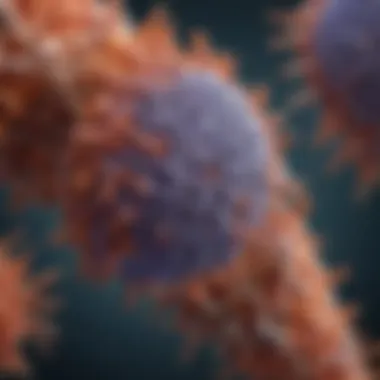
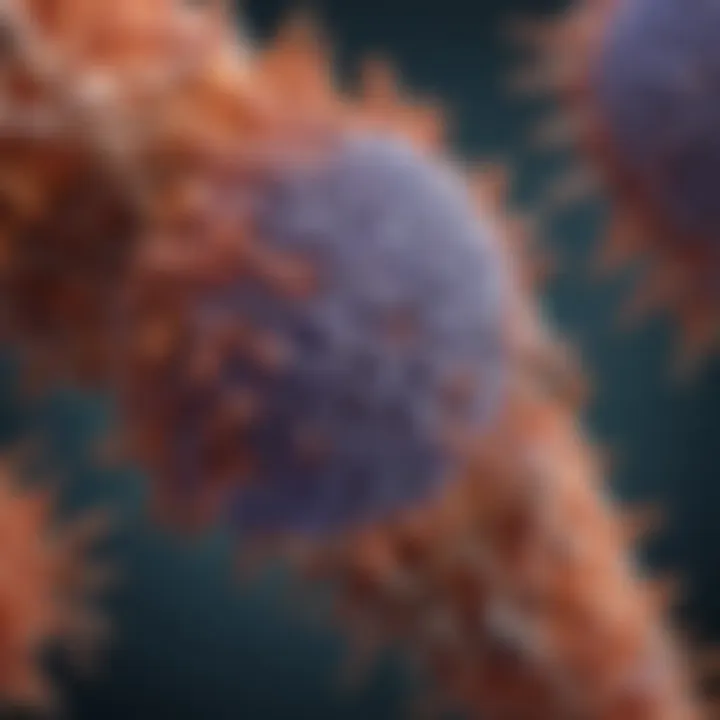
Intro
Nucleocapsid proteins are essential components of viruses. They provide structural integrity to the viral capsid and play a vital role in the virus lifecycle. Understanding nucleocapsid protein antibodies is crucial in both immunology and pathology, as these antibodies are indicators of the immune response to viral infections. The presence of nucleocapsid protein antibodies can reveal insights into the body's defense mechanisms, making them a key subject of study for researchers and professionals.
In this article, we explore various dimensions of nucleocapsid protein antibodies. We begin by dissecting the basic definitions, progressing to their structural features and functions. Furthermore, the role of these antibodies in diagnostic methodologies and vaccine development will be examined. An important aspect of this discussion is the relevance of nucleocapsid protein antibodies in emerging viral pathogens, which remains a growing area of interest amid evolving public health challenges.
Prologue to Nucleocapsid Proteins
Understanding nucleocapsid proteins is essential in the study of viral pathogenesis and immune responses. These proteins are integral components of various viruses, and they play vital roles in the structure and function of viral particles. Nucleocapsid proteins encapsidate viral genomes and are involved in the processes critical for viral replication and assembly. Having a clear comprehension of their characteristics can lead to advancements in diagnostics and therapeutics for viral infections.
Definition and Importance
Nucleocapsid proteins are structural proteins that are associated with the nucleic acid of viruses. They form the nucleocapsid, which is a complex of the viral genome and protein. This structure serves multiple roles: it protects the viral genome from degradation, facilitates the process of viral entry into host cells, and is crucial for the assembly of new virions. In simple terms, without nucleocapsid proteins, many viruses would be unable to thrive.
The importance of these proteins extends beyond just structural integrity. They are often the target of the host immune response. Antibodies generated against nucleocapsid proteins can provide a marker of infection and help monitor the immune status of individuals. Understanding the nuances of nucleocapsid proteins can shed light on viral behavior within the host and inform the development of vaccines and therapies.
Structural Characteristics
The structural features of nucleocapsid proteins vary significantly across different virus families. Typically, these proteins are composed of several functional domains that enable them to interact with the viral RNA or DNA. For instance, in the SARS-CoV-2 virus, the nucleocapsid protein consists of an N-terminal domain that binds the viral RNA and a C-terminal domain that plays a role in protein-protein interactions.
• Flexible Structure: Nucleocapsid proteins often feature flexible linkers and domains, allowing for adaptability during viral assembly and entry.
�• Oligomerization: Many nucleocapsid proteins can form oligomers. This property is crucial for packaging the nucleic acids into a stable form, which is necessary for virus stability and infectivity.
The study of these structural details is important. It can lead to better understanding of how viruses function and how they evade host defenses. Knowledge of the structures of nucleocapsid proteins also aids in the design of antiviral drugs and vaccines.
"Nucleocapsid proteins are at the heart of understanding viral biology and the development of effective treatments."
In summary, the exploration of nucleocapsid proteins offers rich insights into immunology and pathology. Their definition, importance, and structural characteristics lay the groundwork for appreciating their crucial roles in the viral life cycle and the host immune response.
The Role of Nucleocapsid Proteins in Viral Pathogenesis
Nucleocapsid proteins play a crucial role in viral pathogenesis. They contribute to the integrity of the virus structure, influence the replication cycle, and are pivotal in immune interactions. Understanding these proteins is essential for comprehending how viruses cause disease and evade the host's immune system. Their importance extends to vaccine development and therapeutic strategies, emphasizing a need for focused research in this area.
Viruses and Their Nucleocapsid Proteins
Numerous viruses possess nucleocapsid proteins, which vary broadly across different virus families. For instance, coronaviruses, such as SARS-CoV-2, have a major nucleocapsid protein that is vital for RNA packaging and plays a role in immune evasion. Other viruses, like the influenza virus, also have unique nucleocapsid proteins that help in the assembly of viral particles.
- Coronaviruses: Nucleocapsid protein is abundant and involved in genome packaging.
- Influenza Viruses: Nucleocapsid protein interacts with host cell machinery.
- Retroviruses: Their nucleocapsid proteins are key for viral replication and integration.
Each of these proteins not only ensures effective packaging and replication of the viral genome but also modulates the host immune response. Their structural and functional properties directly affect how viruses are transmitted and how they cause disease.
Mechanism of Action in Viral Replication
Nucleocapsid proteins facilitate several steps of viral replication. After a virus enters a host cell, the nucleocapsid proteins help release the viral genome into the cytoplasm. They also play a role in the transcription and translation of viral RNA into proteins. Key processes include:
- Genome Packaging: These proteins bind with viral RNA to protect it and ensure accurate replication.
- Assembly of Viral Particles: Nucleocapsid proteins assist in the formation of new virions by promoting interaction between viral components.
- Modulation of Host Immune Response: By interfering with RNA sensing mechanisms in the host, these proteins aid in viral persistence.
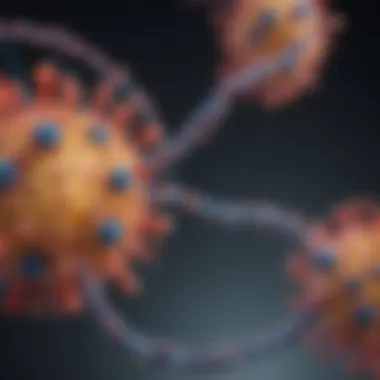

Understanding these mechanisms gives insights into how nucleocapsid proteins contribute to the pathogenesis of viral infections. This knowledge is fundamental for developing diagnostic tools and antiviral therapies that target the unique characteristics of these proteins.
Nucleocapsid proteins are not just structural; they interact with host factors, shaping the course of infections and determining the efficacy of immune responses.
Nucleocapsid Protein Antibodies
Nucleocapsid protein antibodies play a crucial role in immunology and pathology. These antibodies are generated in response to nucleocapsid proteins that are essential components of viral structures. Understanding these antibodies offers insights into viral infections and immune responses. It helps in the diagnosis, monitoring, and treatment of various viral diseases. The importance of these antibodies lies not just in their role in recognizing and neutralizing viral particles, but also in their potential to inform vaccine development and public health strategies.
Types of Nucleocapsid Protein Antibodies
There are several types of nucleocapsid protein antibodies that can be identified based on their specific response to different viral infections. Some common classes include:
- IgM Antibodies: These are often the first antibodies produced in response to an infection. They indicate a recent exposure.
- IgG Antibodies: These antibodies appear later but are critical for long-term immunity. They can indicate previous infections and help in distinguishing between current and past infections.
- IgA Antibodies: Primarily found in mucosal areas, these contribute to immune defense in respiratory and gastrointestinal tracts.
Identifying these different types helps clinicians understand the phase and severity of infection, allowing for precise therapeutic interventions.
Mechanisms of Antibody Response
The mechanisms driving the antibody response to nucleocapsid proteins involve several steps. Initially, when a virus enters the body, immune cells recognize the nucleocapsid proteins as foreign antigens. This recognition triggers the activation of B cells. Once activated, B cells differentiate into plasma cells, which produce antibodies tailored to bind to the specific nucleocapsid proteins.
The process works as follows:
- Antigen Detection: Dendritic cells capture and process viral particles.
- T Cell Activation: T helper cells are activated, further stimulating the B cells.
- Antibody Production: Plasma cells produce antibodies specific to the nucleocapsid proteins of the virus.
Ultimately, the antibodies play vital roles in neutralizing the virus and facilitating its clearance from the body. This entire process underscores the importance of nucleocapsid protein antibodies in both diagnosing infections and developing effective vaccines.
The understanding of nucleocapsid protein antibodies is essential for effective diagnosis and therapeutic strategies in viral diseases.
Detection and Quantification of Nucleocapsid Protein Antibodies
Detection and quantification of nucleocapsid protein antibodies is a critical area in immunology and pathology, especially when dealing with viral infections. Understanding these antibodies can reveal insights into the immune response elicited by the body during viral infections. Reliable detection methods can provide valuable information for diagnosing diseases as well as measuring the efficacy of vaccines.
A comprehensive approach to detection and quantification not only aids in diagnosing active infections but also helps monitor post-infectious immunity. Correctly identifying and measuring these antibodies can lead to better treatment protocols and understanding of viral load in patients. The significance of this section lies in exploring two main methodologies: serological assays and molecular techniques.
Serological Assays
Serological assays are among the most common techniques used to detect antibodies in the serum of infected individuals. They help determine whether a person has been previously infected with a particular virus or if they have developed immunity. There are several types of serological assays, including enzyme-linked immunosorbent assay (ELISA), western blotting, and indirect immunofluorescence. Each of these methods has specific strengths depending on the context of use.
- Enzyme-Linked Immunosorbent Assay (ELISA): This method is popular for its sensitivity and specificity. ELISA can quantitatively measure nucleocapsid protein antibodies by using antigens coated on a microplate. When patient serum is added, any antibodies present will bind to the antigen. A secondary enzyme-linked antibody is then introduced, which reacts to provide a measurable signal.
- Western Blotting: This is a more complex method primarily used for confirmation of initial screening results. It involves separating proteins by size via gel electrophoresis, transferring them to a membrane, and probing with antibodies to detect specific proteins. Western blotting can be especially useful for confirming the presence of nucleocapsid protein antibodies.
- Indirect Immunofluorescence: This technique allows for visualization of antibodies bound to specific viral proteins using fluorescently labeled secondary antibodies. It is particularly valuable in research settings to study antibody localization.
These assays not only confirm the presence of antibodies but can also quantify antibody levels, giving crucial insights into the immune status of patients.
Molecular Techniques
Molecular techniques offer alternative approaches to detecting nucleocapsid protein antibodies, often focusing on the genetic material of viruses. Polymerase chain reaction (PCR) techniques play a crucial role in identifying viral infections and correlating them with the immune response.
PCR-based methods provide a means to detect the presence of viral RNA or DNA, which can further correlate with antibody presence. When antibodies to nucleocapsid proteins are present, they signify past exposure or ongoing infection. These techniques rate highly in specificity and sensitivity.
Additionally, advancements in next-generation sequencing have allowed for simultaneous detection of multiple viruses, which can be valuable in complex cases with co-infections. By analyzing the genetic information, researchers can also evaluate the levels of immunization against particular viral strains.


More novel approaches include reverse-transcription PCR and combined serological and molecular analyses to provide a comprehensive understanding of viral infections and immune responses.
In summary, both serological assays and molecular techniques offer a multifaceted approach to the detection and quantification of nucleocapsid protein antibodies. They play a fundamental role in viral diagnostics and therapeutic monitoring, reinforcing their importance in both clinical and research settings.
Clinical Applications of Nucleocapsid Protein Antibodies
Nucleocapsid protein antibodies play a pivotal role in clinical settings, particularly in the diagnosis of viral infections and the monitoring of disease progression. Understanding these applications can enhance the overall management of viral diseases and inform research into new treatment modalities.
Diagnosis of Viral Infections
The detection of nucleocapsid protein antibodies is crucial for diagnosing viral infections. These antibodies are produced in response to the presence of nucleocapsid proteins in the body during viral replication. Serological assays, such as enzyme-linked immunosorbent assays (ELISA), are commonly employed to identify these antibodies in patient samples.
- Specificity and Sensitivity: One key advantage of using nucleocapsid protein antibodies in diagnosis is their high specificity. This leads to fewer false positives compared to other types of antibodies. The sensitivity of these assays is also significant, enabling the detection of antibodies early in the disease progression, thus aiding timely intervention.
- Rapid Testing: In the context of ongoing infectious outbreaks, which can be especially critical in managing diseases such as COVID-19, rapid tests for nucleocapsid protein antibodies can provide immediate data regarding patient status, which is vital for both treatment decisions and public health responses.
- Differentiating Infection Stages: The presence of specific antibodies can also help distinguish between active infection and past exposure. This is essential for epidemiological studies and helps health professionals understand immunity levels within populations.
"Detection of nucleocapsid protein antibodies allows for early diagnosis and effective public health responses to viral outbreaks."
Monitoring Disease Progression
Using nucleocapsid protein antibodies for monitoring disease progression offers insights that are not only beneficial but also necessary for improving patient outcomes. This application is especially relevant in chronic viral diseases, where continuous assessment of the immune response can guide treatment adjustments.
- Tracking Immune Response: The levels of nucleocapsid protein antibodies can indicate how well the immune system is responding to a viral infection. Increasing levels may suggest that the body is effectively fighting the virus, while decreasing levels might indicate waning immunity or an ineffective response.
- Efficacy of Treatment: Monitoring these antibodies can also help clinicians assess the efficacy of antiviral therapies. If antibody levels drop significantly, it could suggest that the treatment is effective and the disease is under control. Conversely, if levels remain high or increase, this may prompt a reevaluation of the treatment plan.
- Long-term Surveillance: For some viruses, such as HIV or Hepatitis, long-term monitoring of nucleocapsid protein antibodies can play a role in chronic disease management. This ongoing assessment can help manage therapy compliance and predict potential complications of the disease.
Nucleocapsid Protein Antibodies in Vaccine Development
Nucleocapsid protein antibodies play a significant role in the development and evaluation of vaccines. These antibodies are associated with the immune response elicited against viruses and provide insights into how well a vaccine functions. Understanding the relationship between nucleocapsid proteins and the immune system is paramount for developing effective vaccines. The role of these antibodies can be summarized in two key areas: the immune response they generate and their utility in assessing vaccine efficacy.
Role in Immune Response
Nucleocapsid proteins are central to the immune response triggered by viral infections. When a virus enters a host, the nucleocapsid proteins become targets for the immune system. The immune response is primarily mediated by B cells, which produce antibodies specific to these proteins. The specific antibodies bind to nucleocapsid proteins, marking the infected cells for destruction by other immune cells.
Moreover, nucleocapsid protein antibodies tend to induce both humoral and cellular immunity. This dual response can increase the chances of effective protection against future infections. Studies have shown that vaccines incorporating nucleocapsid proteins can lead to strong and long-lasting immunity. Key considerations regarding this immune response include:
- Duration of Immunity: How long do these antibodies remain effective after vaccination?
- Cross-Reactivity: Do these antibodies provide protection against related viruses?
- Memory Response: How effectively does the immune system remember the nucleocapsid protein?
Additionally, the role of nucleocapsid protein antibodies extends to identifying potential variants of a virus. Monitoring changes in these proteins helps in adapting vaccine strategies, ensuring they remain effective against evolving strains.
Assessing Efficacy of Vaccines
Evaluating the efficacy of vaccines is critical for public health. Nucleocapsid protein antibodies are valuable indicators in this regard. They can be measured through various serological assays, providing data on the immune status of individuals post-vaccination. Higher levels of these antibodies usually correlate with better protection against viral infections.
In the clinical development phase, the presence of nucleocapsid protein antibodies can:
- Verify Immune Response: Confirm whether a vaccine stimulates a proper immune response.
- Predict Protective Immunity: Assess whether the levels of these antibodies are sufficient to provide protection in the population.
- Facilitate Comparisons: Allow for comparison between different vaccine formulations and their effectiveness.
"The measurement of nucleocapsid protein antibodies is critical for optimizing vaccine strategies and ensuring public health safety."
Challenges in Studying Nucleocapsid Protein Antibodies
The study of nucleocapsid protein antibodies presents several vital challenges that significantly influence the progress of research in this area. Understanding these difficulties is crucial for researchers, educators, and professionals who aim to develop effective methodologies for diagnosis, treatment, and vaccination against viral infections. Some of the primary elements at play include variability among viruses as well as limitations in current research practices.
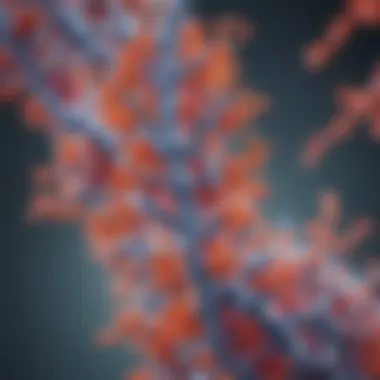
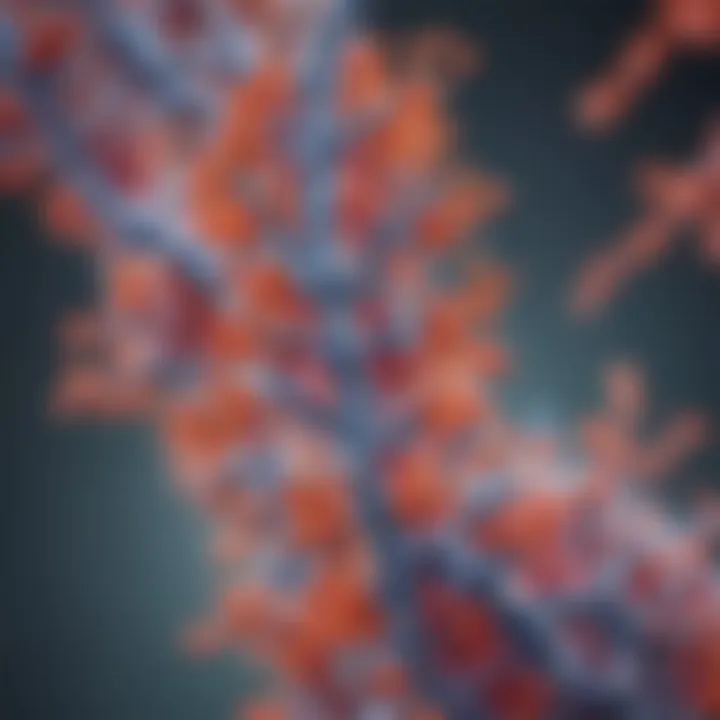
Variability Among Viruses
Nucleocapsid proteins are pivotal for the assembly and protection of viral genetic material. However, the variability of these proteins among different viruses complicates the study of nucleocapsid protein antibodies. This variability can lead to different immune responses, depending on the specific virus in question. For instance, the nucleocapsid proteins of the influenza virus differ significantly from those of the coronaviruses, such as SARS-CoV-2. As a result, an antibody that is effective against one virus's nucleocapsid may not provide adequate protection or diagnosis for another.
Researchers must navigate this intricate landscape of viral diversity. Understanding the nuances requires comprehensive analyses of various viral strains and their respective nucleocapsid proteins. This complexity not only stretches available resources but also complicates the development of universal assay methods. In essence, the diverse nature of nucleocapsid proteins adds a layer of difficulty in designing broad-spectrum diagnostics and vaccines.
Limitations in Current Research
Current research on nucleocapsid protein antibodies faces several limitations that hinder advancements. Firstly, funding and resource allocation can profoundly impact the scope of research. Many laboratories lack access to adequate samples, advanced technologies, or enough financial support to conduct extensive studies.
Moreover, there is a lack of standardization in the methodologies used in studies assessing nucleocapsid protein antibodies. Each research team may employ different assays or detection methods, leading to inconsistent results and difficulties in comparing studies.
Another limitation is that many studies do not fully analyze the relationship between antibody levels and viral load or immune response. This gap in understanding is significant, as it may result in understating the protective role of nucleocapsid proteins in certain infections. Without further exploration of these relationships, creating effective strategies for diagnosis and treatment becomes increasingly challenging.
"Nucleocapsid protein antibody research is at a pivotal juncture. Addressing these challenges will pave the way for more effective immunological assessments and interventions."
Future Directions in Research
Understanding the future directions in research related to nucleocapsid protein antibodies is critical for several reasons. These antibodies represent a significant aspect of the immune response to viral infections, especially considering the growing complexity of emerging pathogens. As we advance in the field of immunology, it is essential to identify the specific aspects that dictate the role and efficacy of these antibodies in various diseases.
Emerging Pathogens and Nucleocapsid Protein Antibodies
Emerging pathogens pose a substantial challenge to global health. The role of nucleocapsid protein antibodies in response to these new threats is a vital area of investigation. As viruses evolve, understanding their nucleocapsid proteins can provide insight into their pathogenesis and how the immune system responds to them.
Research should focus on the following aspects:
- Characterization of Antibody Responses: Studying how these antibodies develop against novel viral nucleocapsid proteins can illuminate potential targets for vaccine development.
- Cross-Protection: Investigating whether antibodies generated from one virus can provide immunity against another similar pathogen could lead to broader immunization strategies.
- Diagnostics: Developing rapid tests utilizing nucleocapsid protein antibodies could help in timely identification of emerging infections.
Advancements in Detection Methods
The detection of nucleocapsid protein antibodies is crucial for diagnosing viral infections and monitoring immune responses. Recent advancements in technology have significantly improved detection methods, making them more efficient and reliable. A few key factors include:
- High-Throughput Techniques: Innovations in high-throughput screening methods allow for the simultaneous testing of multiple samples. This can expedite research and clinical applications.
- Sensitivity and Specificity Improvements: Enhanced assays with better specificity reduce false positives and negatives, thereby increasing confidence in results.
- Point-of-Care Testing: The development of portable and user-friendly diagnostic tests has made it feasible to conduct antibody testing in remote areas, thus aiding in quicker response to outbreaks.
Continued research in these areas will ensure that nucleocapsid protein antibodies remain at the forefront of viral immunology, ultimately contributing to better public health outcomes.
Epilogue
In reviewing the role of nucleocapsid protein antibodies, it is evident that they contribute significantly to the understanding of viruses and their interactions with the immune system. These antibodies play a pivotal role in diagnostics, allowing for the detection of viral infections. Their importance extends beyond immediate applications, providing insight into the underlying mechanisms of immune responses.
Summary of Findings
The discussions in this article have outlined critical aspects about nucleocapsid protein antibodies. Key points include:
- Definitions and Importance: Nucleocapsid proteins are essential components of viruses, and antibodies against them serve as valuable markers in immunology.
- Role in Viral Pathogenesis: Understanding how these proteins facilitate viral replication helps in delineating their function in infections.
- Detection Methods: A variety of techniques, including serological assays and molecular methods, are employed to detect these antibodies in clinical settings.
- Vaccine Development: Insights from nucleocapsid protein antibodies guide researchers in determining vaccine efficacy and optimizing immune responses.
"Nucleocapsid protein antibodies are critical tools for diagnostic and therapeutic interventions in viral infections."
Implications for Future Research
Looking ahead, several avenues merit exploration. Research should focus on:
- Emerging Pathogens: As new viruses surface, studying their nucleocapsid proteins and associated antibodies will aid in developing timely interventions.
- Technological Innovations: Advancements in detection methods can enhance the sensitivity and specificity of nucleocapsid protein antibody assays, leading to better clinical outcomes.
- Longitudinal Studies: Long-term studies on antibody responses could provide comprehensive insights into immune memory and protection against reinfections.
Research into nucleocapsid protein antibodies not only strengthens our understanding of existing viral threats but also prepares us for future challenges in infectious disease management.







